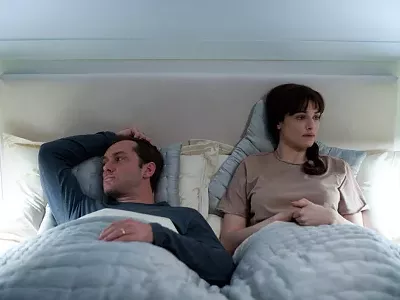
Audio By Carbonatix
[
{
"name": "GPT - Leaderboard - Inline - Content",
"component": "35519556",
"insertPoint": "5th",
"startingPoint": "3",
"requiredCountToDisplay": "3",
"maxInsertions": 100,
"adList": [
{
"adPreset": "LeaderboardInline"
}
]
}
]

Some films wear the badge of "not for everyone" with pride. David Cronenberg's Cosmopolis takes that boast several steps further, and almost achieves the status of anti-entertainment. His film's dialogue is stilted and intellectually cryptic, his direction is cold and calculated, his characters are dull-eyed and passionless, and the setting is, mostly, static.
And yet, there are still things to admire in Cronenberg's hypnotic anti-capitalist screed. The Canadian director is far too talented to let his cinematic affectations get in the way of his craft. Spending most of its running time in the eerily silent interior of a limo, he takes a story that is rarely incidental and, against all odds, makes it feel like a thriller. His visuals are sleek and rich, and — just when the script presents yet another insipidly elliptical conversation — a moment of deadpan absurdity or emotional brutality will reel us back in.
As he did in Naked Lunch, Videodrome or ExistenZ, Cronenberg clinically deconstructs language and human relationships while examining our almost insectoid need to consume. Whether it's a craving for sex, food or money, Cosmopolis seems to view capitalism as the ultimate expression of parasitic impulses, a system in which human beings devolve into biomechanical automatons, programmed only to acquire more and more as self-awareness and -expression become devoid of content or even logic. If you're looking for the thematic opposite of Atlas Shrugged, Cosmopolis just might be your cup of tea.
Faithfully adapted from Don DeLillo's 2003 novel, the movie is set in New York City's near-future. Eric Packer (Robert Pattinson) is a 28-year-old master of the universe, riding in his limo across Manhattan in order to get a haircut. Stuck in a seemingly endless traffic jam (the president is in town), Packer meets with colleagues, conducts business, bangs a few women, and even gets a prostate exam in the womb-like comfort of his high-tech sarcophagus. His conversations about economics, art, society and self-actualization are dense but ultimately empty of meaning. All that matters is the hunger that each character experiences. Unfortunately, none finds satisfaction or connection.
Outside, the public is in revolt. Riots blanket the city and discontent has taken hold. And yet Eric feels nothing, even as he learns that his life might be in danger. Success has robbed him of both joy and fear, as he has become the ultimate personification of pointless wealth, a predator who has abandoned all human feeling in a never-ending quest for more. To drive home this point, he talks endlessly, but says nothing worth listening to, and he connects with no one.
Cosmopolis is clearly tapping a vein here, intellectually channeling the rage of the Occupy movement into a dreamy satire in which the rich have become distorted copies of human beings. One of Cronenberg's cleverer devices is the growing presence of asymmetry, or as Packer's would-be killer calls it, the "beauty of the lopsided." As Eric seeks to achieve perfection, he becomes more and more disheveled, losing his sunglasses, then tie, then jacket, discovering that his prostate is lopsided, getting hit by a cream pie and, finally, receiving only half a haircut.
"I fear my sex organ is retracting into my body," a character says. According to DeLillo's fetishized doublespeak, capitalism has yet to elevate us, instead it's turned us into something shrunken and impotent.
And Cronenberg's cast is more than game to illustrate those poetic indictments. Pattinson is perfectly blank as a handsome cipher who tossed away his humanity long ago. He is matched by the emotional void of Sarah Gadon, who plays his listless poet of a wife. Juliette Binoche is feisty but hollow as Packer's aging sex mistress, while Kevin Durant injects some much-needed working-class stoicism and responsibility as Eric's chief of security, traits that are ultimately punished by betrayal.
Alienating and probably twice as long as it needs to be to make its point, Cosmopolis is a film that's easier to respect for its intellectual rigor and social critique than it is to enjoy. The movie's muted and episodic nature is incapable of sustaining a central story worth caring about. Cronenberg is, instead, taking you into an existential Heart of Darkness, where mankind's insatiable appetite leaves it with nothing to devour but itself. Sounds like a matinee of fun, doesn't it? Maybe it's best to think of the movie as a meta-expression of anti-capitalism, one that defiantly hopes that you'll stay home and ensure box office failure in order to protest against a system that leaves all of humanity bankrupt.





